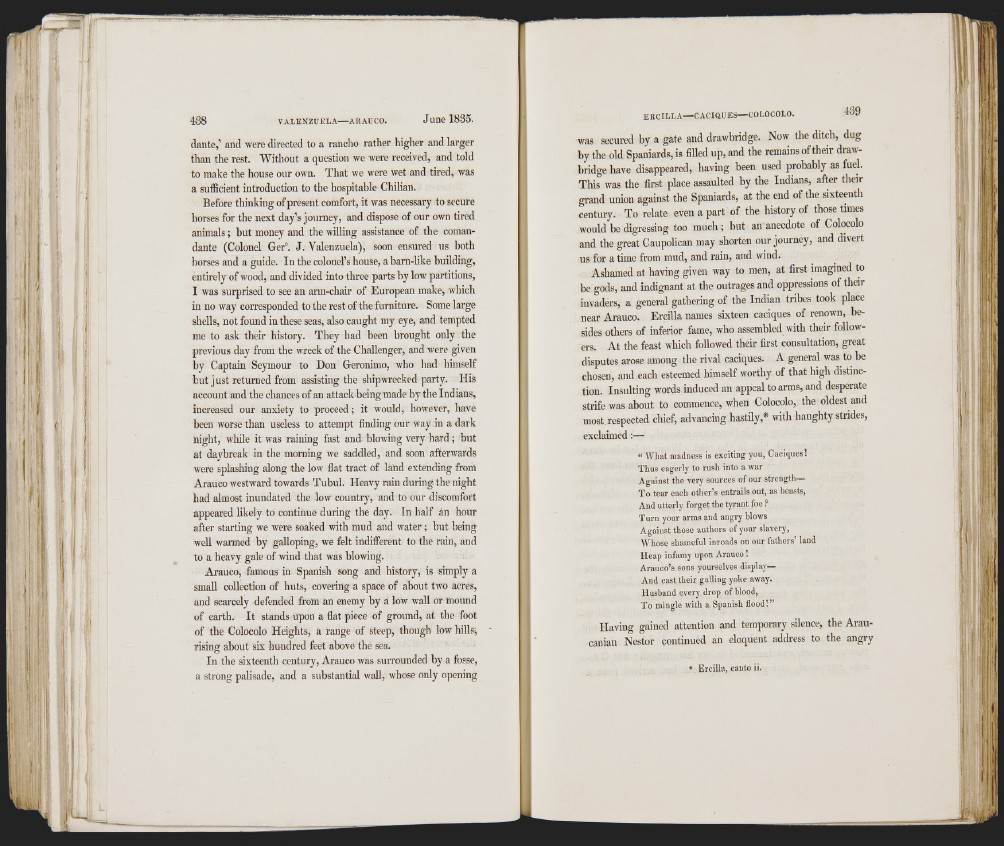
438 VALENZUELA ARAUCO. June 1835.
dante,’ and were directed to a rancho rather higher and larger
than the rest. Without a question we were received, and told
to make the house our own. That we were wet and tired, was
a sufficient introduction to the hospitable Chilian.
Before thinking of present comfort, it was necessary to secure
horses for the next day’s journey, and dispose of our own tired
animals; but money and the willing assistance of the comandante
(Colonel Ger°. J . Valenzuela), soon ensured us both
horses and a guide. In the colonel’s house, a barn-like building,
entirely of wood, and divided into three parts by low partitions,
I was surprised to see an arm-chair of European make, which
in no way corresponded to the rest of the furniture. Some large
shells, not found in these seas, also caught my eye, and tempted
me to ask their history. They had been brought only the
previous day from the wreck of the Challenger, and were given
by Captain Seymour to Don Geronimo, who had himself
but just returned from assisting the shipwrecked party. His
account and the chances of an attack being made by the Indians,
increased our anxiety to proceed; it would, however, have
been worse than useless to attempt finding our way in a dark
night, while it was raining fast and blowing very hard ; but
at daybreak in the morning we saddled, and soon afterwards
were splashing along the low flat tract of land extending from
Arauco westward towards Tubul. Heavy rain during the night
had almost inundated the low country, and to our discomfort
appeared likely to continue during the day. In half an hour
after starting we were soaked with mud and water ; hut being
well warmed by galloping, we felt indifferent to the rain, and
to a heavy gale of wind that was blowing.
Arauco, famous in Spanish song and history, is simply a
small collection of huts, covering a space of about two acres,
and scarcely defended from an enemy by a low wall or mound
of earth. It stands upon a flat piece of ground, at the foot
of the Colocolo Heights, a range of steep, though low hills;
rising about six hundred feet above the sea.
In the sixteenth century, Arauco was surrounded by a fosse,
a strong palisade, and a substantial wall, whose only ojiening
e r c i l l a CACIQUES COLOCOLO. 439
was secured by a gate and drawbridge. Now the ditch, dug
by the old Spaniards, is filled up, and the remains of their drawbridge
have disappeared, having been used probably as fuel.
This was the first place assaulted by the Indians, after tbeir
grand union against the Spaniards, at the end of the sixtemth
century. To relate even a part of tbe history of those times
would be digressing too much ; but an anecdote of Colocolo
and the great Caupolican ™ay shorten our journey, and divert
us for a time from mud, and rain, and wind.
Ashamed at having given way to men, at first imagined to
be gods, and indignant at the outrages and oppressions of their
invaders, a general gathering of the Indian tribes took place
near Arauco. Ercilla names sixteen caciques of renown, besides
others of inferior fame, who assembled with their followers.
At the feast which followed tbeir first consultation, great
disputes arose among the rival caciques. A general was to be
chosen, and each esteemed himself worthy of that high distinction.
Insulting words induced an appeal to arms, and desperate
strife was about to commence, when Colocolo, the oldest and
most, respected chief, advancing hastily,* with haughty strides,
exclaimed :—
“ What madness is exciting you, Caciques!
Thus eagerly to rush into a war
Against the very sources of our strength—
To tear each other’s enti-ails out, as boasts.
And utterly forget the tyrant foe ?
Turn your arms and angry blows
Against those authors of your slavery.
Whose shameful inroads on our fathers’ land
Heap infamy upon Arauco !
Arauco’s sons yourselves display—
And cast their galling yoke away.
Husband every drop of blood.
To mingle with a Spanish flood!”
Having gained attention and temporary silence, the Araucanian
Nestor continued an eloquent address to tbe angry
* Ercilla, canto ii.
fl«
I
f
|i|i'
il I